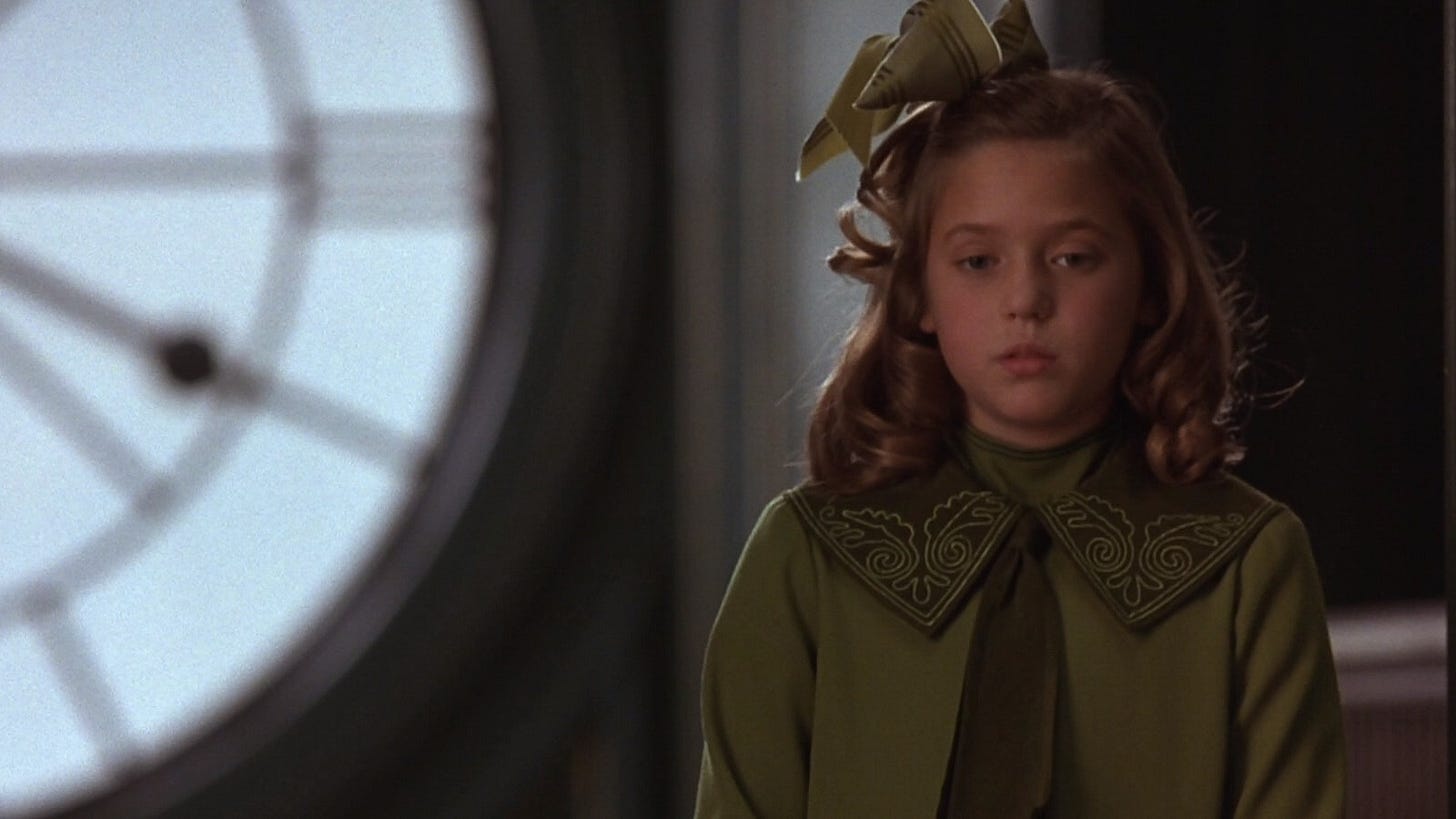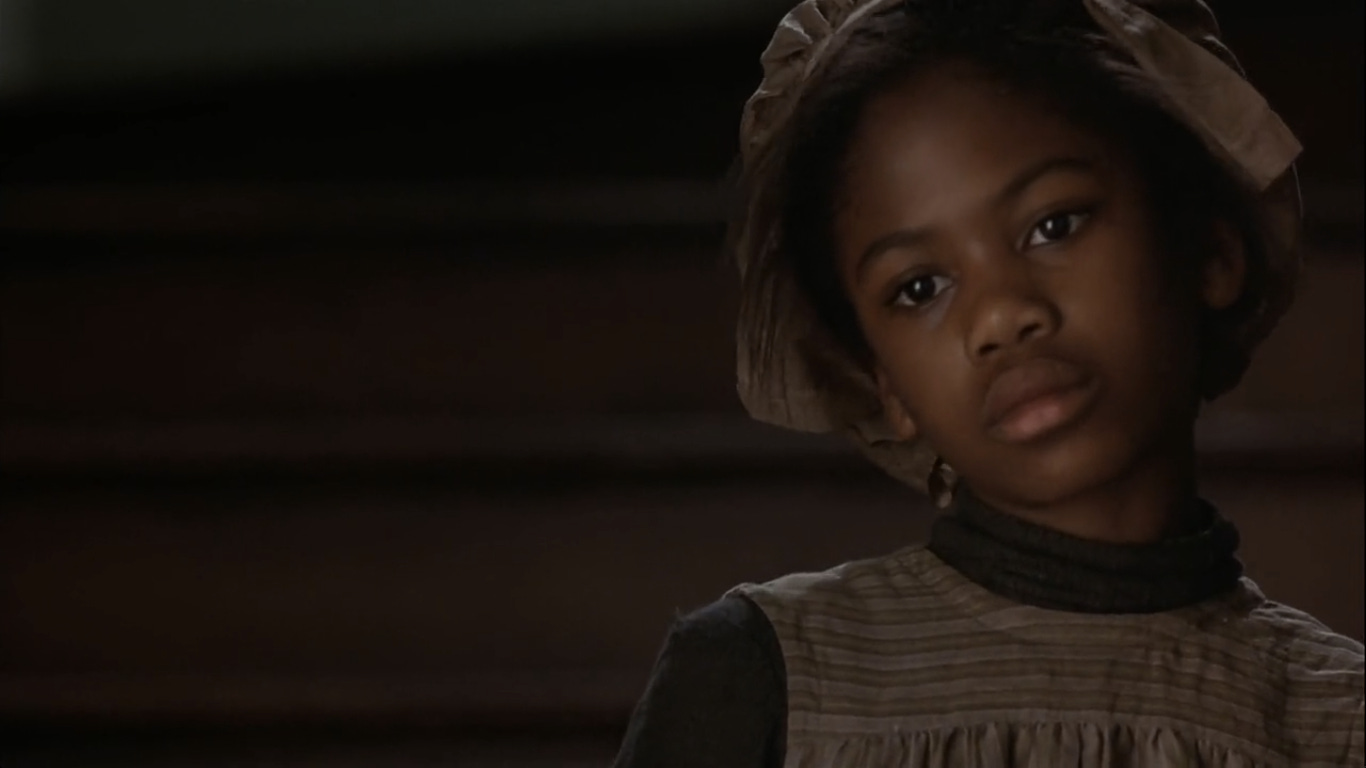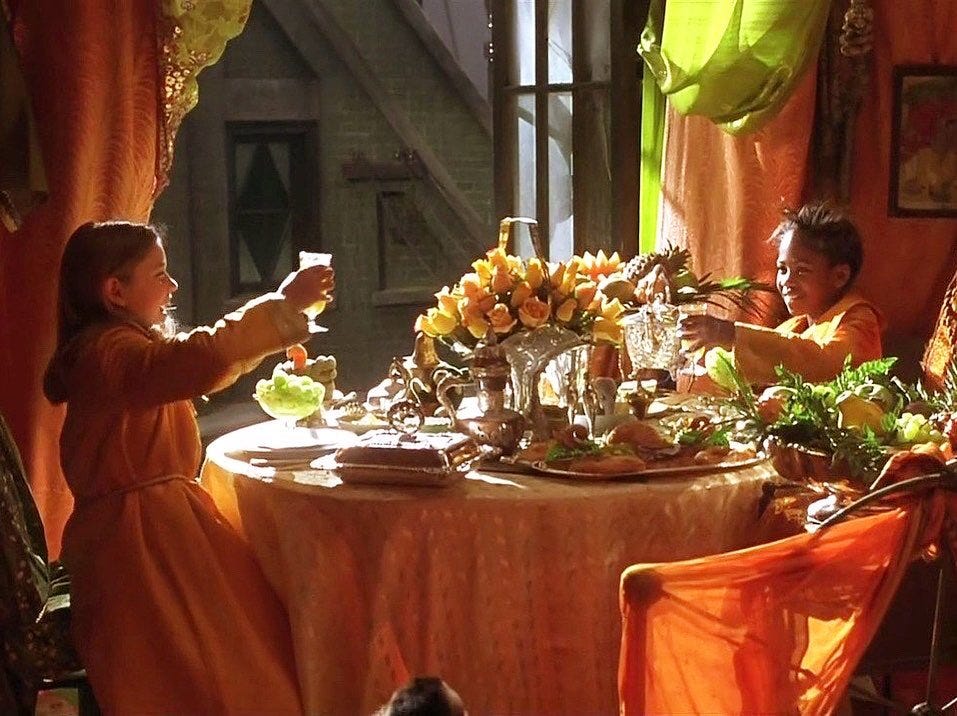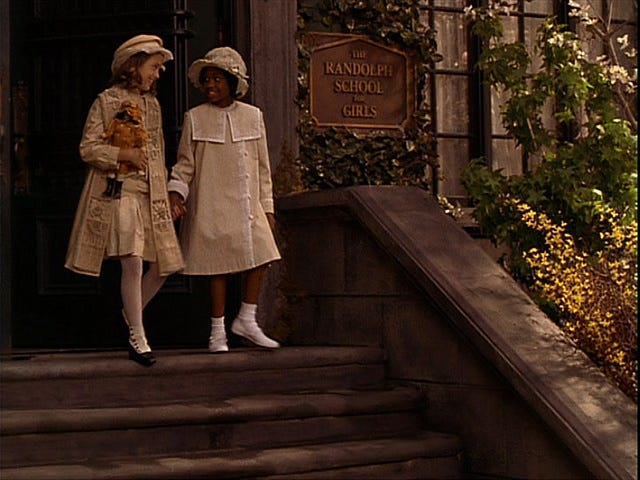A Little Princess
You can be anything you want to be, my love. As long as you believe
Last week I mentioned I had initially planned on writing about a different movie before revisiting Meet The Robinsons and feeling inspired to write about it. I promised I'd cover the original film in the future, and this week I decided it was time to rewatch 1995's A Little Princess. Unfortunately, it didn't have much of a lasting impact on society, and it might seem random that I'd choose to analyze such a forgettable film that's over two decades old. However, for me, A Little Princess wasn't as forgettable as it was to most others.
The film is based on Frances Hodgson Burnett's novel of the same name. The movie might not be remembered by many, but it has some big names behind it. Mexican filmmaker Alfonso Cuarón, best known for his Oscar-winning films Gravity and Roma, directed the G-rated drama with Rain Man producer Mark Johnson also on board.
I watched this movie a lot as a kid, and while I realized a lot more problematic aspects than I remember from when I was a child, its themes around hope, belief, and imagination still ring true for me. On Movie Mondays With Gina, I like to cover films that allow me to dive beneath the surface and discover greater meaning than meets the eye. I chose A Little Princess so I could delve into the importance of nurturing and healing the inner child. This is something I am so passionate about, whether I'm speaking to my younger self in meditations or revisiting old movies I loved as a kid.
Healing the inner child has a lot to do with reassuring yourself and speaking to yourself the way you wish a parent or caretaker had when you were younger, but it's also related to keeping your childlike wonder alive. Not everyone had a happy childhood, and this is prevalent in A Little Princess with the way Miss Minchin treats the children at her Seminary For Girls. However, if you look back on the happiest moments from your childhood, you'll remember the times you were the most carefree and imaginative. When you allowed yourself to be excitable, to daydream, and to play make-believe.
Revisiting movies that make me feel this way helps me connect with my inner child, which is exactly why I wanted to watch A Little Princess again and write about it for my newsletter. Before sitting down to write about the film, I took time to google what others thought about it from an adult perspective. I found everything from people calling A Little Princess their problematic fave to A Little Princess: Intersectional Feminist Masterpiece? by an author named Kitty. The author delves into the film's problematic elements, as well as Sara's immense privilege.
However, she also points out that Sara uses her privilege for good, and even when some of her actions come across as ignorant, she's always acting out of the goodness of her heart. She's only a child, after all, and really doesn't know any better. Like most movies I watch, I found myself most drawn to its optimism. Despite her circumstances, Sara uses her imagination to create her own world, which uplifts her and all the other girls at Miss Minchin's Seminary for Young Girls. Sara is a true "girl's girl," whether the friends she's entertaining with her stories are wealthy like her or living in the school's attic as a servant.
Sara even informs Miss Minchin of an important lesson she learns at the start of the film, "all girls are princesses," which she says applies to women in elegant clothing and to those dressed in rags. Sara doesn't believe class determines someone's worth or how they should be treated in the world.
Sara's ignorance comes out in a scene after she comforts a little girl named Lottie, who misses her mother and will never see her again because she's passed away. Sara knows this feeling all too well, as her own mother passed when she was younger. Sara's also dealing with her father being away at War, which is what brought her to the Seminary.
Sara helps Lottie feel less alone, teaching her that she can talk to her mother whenever she wants. Sara tells Lottie her mother is an angel, living in a castle made of sunflowers and sending her messages from heaven. This calms Lottie down in a way no one else can because Sara has a deep level of compassion that sets her apart from the other characters in the film.
While Sara is comforting Lottie, some other girls listen in on her beautiful stories. One is a black girl named Becky. Becky runs away when Sara notices her, and Lottie tells her Becky isn't allowed to talk to the other girls because she's a servant and "she has dark skin." Sara responds, "So?" Clearly, Sara has no understanding of discrimination in America, meaning her British father hasn't filled her in on the many prejudices in the world. Sara's seemingly grown up in her own bubble where everything is wonderful and possibilities are endless. While she knows the sadness and grief of losing a parent, she doesn't know the adversities those less privileged than her face.
On the other hand, Sara had a perfectly natural response for a child raised in India, engulfed in its culture and unaware of Western society. The film fixes a lot of the book's problematic elements, though there's still something about Sara living as a wealthy white girl in India and telling stories about the culture as if their her own, which I understand can be offensive. Though, there's also something beautiful about Sara sharing the culture with others in America, which Ram Dass seems to admire.
Sara also can be seen as a white savior character, but because she's only a child, it's obvious her kindness is coming from a genuine place. Her nonchalant reaction to Becky's skin color can also teach other kids how to see everyone as equal. It seems to have this effect on Lottie.
After the scene, Sara follows Becky into the attic, where she sees her icing her feet. Her immediate thought is to help her, so she gifts her a pair of extravagant fur shoes. There's an issue in society where people think throwing expensive gifts at the less fortunate will solve all their problems. Again, Sara is only a child, and she's doing what she believes is right. She saw Becky was injured, so she gave her comfortable shoes so she wouldn't be in pain anymore.
What's most important is Sara's letter, where she tells Becky she hopes they can be friends. Sara and Becky's budding friendship is so important because Becky has been cast out by Miss Minchin and the other girls. When Sara arrives, she finally sees Becky. A lot of trauma arises from never feeling seen, and by the look on Becky's face when she opens Sara's gift, it's clear Sara's thoughtfulness and attentiveness mean a lot to her.
"Magic has to be believed. That's the only way it's real,” Sara’s father tells her.
Becky later returns the favor when Sara is in need, which to me, represents true friendship. Even though Becky doesn't have what Sara has, she still shows up for her the best way she can, and that's what relationships should be. About 40 minutes into the film, Sara is informed her father was killed on the battlefield, and the British government has seized control of his company and his assets.
Sara loses everything from her extravagant wardrobe to her massive suite, which is bigger than all the other girls' rooms. This is where Sara's imagination and optimism are tested. There's even a significant scene where a black balloon floats toward her and pops, like something out of IT. The news of Sara's father's death has busted her perfect bubble, and her new reality is about to challenge everything she believes and test her ability to remain true to herself and her faith in the face of adversity.
Sara now has to live in the attic with Becky. Becky's gift to Sara is a pillow with an image of India on it which she sewed based on the stories Sara told. This scene showcases how much the other girls have learned from Sara. Becky was able to see past her circumstances because of Sara's kindness and leadership. While Miss Minchin discourages the girls and teaches them to see the world as a cold place full of struggle, Sara shifts their perspective to look at the world as a beautiful place full of opportunity.
The fact that Sara is able to get through to someone like Becky shows how powerful her message is. It also shows the type of person Becky is. She wants to be optimistic and excited about life like Sara. She just hasn't been given that opportunity in life like Sara has. However, Sara is generous with her knowledge and imagination. She wants to share it with others, and because she's so confident in spreading her message, she's able to help everyone around her who allows themselves to be inspired.
The most devastating part of Sara's riches-to-rags story is not that all her luxuries were taken away from her but that her father was. This is why she really lost all hope. He was the one who instilled all her beliefs in her. At the start of the film, he tells her, "You can be anything you want to be, my love. As long as you believe." Even when he's away at War, she knows he's still with her. She writes him letters keeping him up to date on all the happenings at the Seminary. With her mother gone, he's all she has. So when he dies too, everything she learned dies with him.
Luckily, Sara soon learns she can't let go of everything her father taught her just because he's not with her anymore. In fact, doing so would be the ultimate betrayal. She has to believe in what he raised her to believe, whether he's alive or not. Sara's perspective shifts massively in a scene where Miss Minchin catches all the girls in the Seminary in the attic with Sara, where they aren't supposed to be. Sara suffers the consequences by being deprived of breakfast, lunch, and dinner and performing all of Becky's chores since Becky is punished by being locked in her room all day. Miss Minchin tells Sara:
"Real life has nothing to do with your little fantasy games. It's a cruel, nasty world out there, and it's our duty to make the best of it, not to indulge in ridiculous dreams but to be productive and useful."
Sara stands up to Miss Minchin, telling her she doesn't believe what she's told her. It's here Sara declares she is still a princess because, as she learned early in the film, "all girls are princesses." Sara affirms that her wealth is not what made her a princess and that a girl who lives in an attic wearing rags is just as much a princess as a girl who has all the riches in the world.
Sara triggers something deep in Miss Minchin when she asks her if her father ever told her she was a princess. The film never explores what Minchin's childhood was like or why she's so cold and abusive to the girls, but we can imagine something horrible must of happened to her, especially when she leaves the attic and wipes a tear from her face in the hallway, for the first time expressing that she does experience other emotions besides anger.
Miss Minchin was happy when Sara's father was declared dead, and she could send Sara to the attic with Becky because she thrives on other people's misery. The easiest way to deal with people like her in real life is to get angry, to write them off as horrible. It takes a lot of courage and mental strength to find compassion. Of course, Minchin was incredibly abusive, and her past does not excuse her horrible actions, but the scene in the hallway is a reminder that the meanest people are often the ones who have had it the worst.
A Little Princess reminds us there are various ways to deal with pain, and following Sara's model is far more productive. In circumstances where you're surrounded by people like Miss Minchin, trying to tear down your dreams or your happiness, it's best not to let them into your mind.
After Sara stands up to Miss Minchin, she continues using her imagination and inspiring Becky to do the same. She refuses to suffer and tells Becky to imagine a feast with all kinds of food and a table dressed with a lavish tablecloth and elegant decor. She even imagines them wearing regal clothing, with Becky adding that she'd love to wear a dress covered in diamonds. The girls go as far as to pretend they can smell sausages from the feast. They don't care that these things aren't actually there. Just playing make-believe brings them joy.
This goes back to my earlier message about keeping your inner child alive. As kids, we believe in magic and endless possibilities, then we grow up, and life presents us with a series of negative circumstances, leading us to believe all the magical things we once believed in are unrealistic and no longer possible for us. When I was younger, I wanted all kinds of things that if I were to tell people about now as an adult, I would be met with eye rolls and cynicism.
"Don't you ever do that, Miss Minchin? Believe in something just to make it seem real?” Sara asks Miss Minchin.
I went through periods of time where I stopped believing amazing things were possible for me or that I could do something extraordinary with my life. Eventually, I found my way back because deep down, I never let go of that childlike wonder. Revisiting movies like A Little Princess re-sparks this joy and inspiration in me whenever life begins to feel dull. In my opinion, it is in your best interest to do the same and decide that you're going to start believing in all the things you believed as a kid again.
Unbeknownst the Sara and Becky, when they are imagining their feast, Ram Dass is watching from the window of a building across from theirs. It turns out Sara's father isn't dead. He was mistaken for another soldier. Though he's dealing with some memory loss and temporary blindness from the poison gas he endured during War, it's confirmed he will get better. In the meantime, he stays with Ram Dass, who takes care of him. Sara's father is resting in bed as Ram Dass watches over her and Becky like a guardian angel. The next morning when Sara and Becky wake, they're greeted with a feast, and their rundown attic has been transformed into the castle they imagined it to be.
Ram Dass is something of a mystical character throughout A Little Princess. He lingers around and connects Sara to her upbringing in India, where she learned to have a large imagination and believe in endless possibilities. We never learn how Ram Dass was able to transform the attic while the girls were asleep, but we learn a crucial message about how powerful imagination is. Living life in the mental state of abundance and gratitude, mixed with the power of belief, will bring great fortune.
Storytelling is a massive theme in A Little Princess, and as a storyteller, I guess that's why I'm so drawn to the film. It's a powerful outlet, and it's what keeps us moving through life when things get rough. If you've ever lost yourself in your favorite book or movie, like how I've found myself lost in every film I've covered on Movie Mondays With Gina, you'll understand why Sara keeps telling her stories. In one scene, she changes the ending of a book she's reading in class. Of course, this infuriates Miss Minchin, but her classmates are intrigued. They gather around to hear Sara's tale because it inspires them and keeps them hopeful that the world isn't actually as cruel as Miss Minchin has taught them it is.
By the end of the film, Sara reunites with his father after Ram Dass uses his magic to help him remember his daughter. They leave the abusive Seminary. Miss Minchin pays for her mistreatment by becoming a chimney sweeper while her Seminary is given to Mr. Randolph, whose son was the one who actually died in War. Sara goes home with her father, who seemingly adopts Becky too. Luckily, the other girls are in good hands now, and Sara even gives them her doll to remember her by.
A Little Princess is far from perfect, but after rewatching it, I wish it had been more memorable throughout the years. Even Curaón once said if he could rescue just one of his films, it would be A Little Princess because of all the beautiful memories he made on set. It's a beautiful story, and while many minds resonate with Miss Minchin and find it unrealistic, pushing delusions of magic and daydreams, remember what I wrote earlier, it will do you no good to forget all the magic you believed in as a child.












This is actually a REALLY well written response. Great Job! 👏
that tought me something GOOD